
Donate to Innerviews
Since 1994, Innerviews has provided uncompromising, in-depth interviews with musicians across every genre imaginable. And it does that with no trackers, cookies, clickbait, or advertising.
Your donations are welcome to help continue its mission of highlighting incredible music and artists, without any commercial considerations.
Your contributions will be instantly transformed into stories and videos, and cover hosting and web management costs. Importantly, your dollars will help ensure Innerviews remains absolutely free to all visitors, independent of their ability to financially support it.
Please consider making a donation today by using the PayPal QR code below.

Richard Barbieri
Exploring Dualities
by Anil Prasad
Copyright © 2017 Anil Prasad.
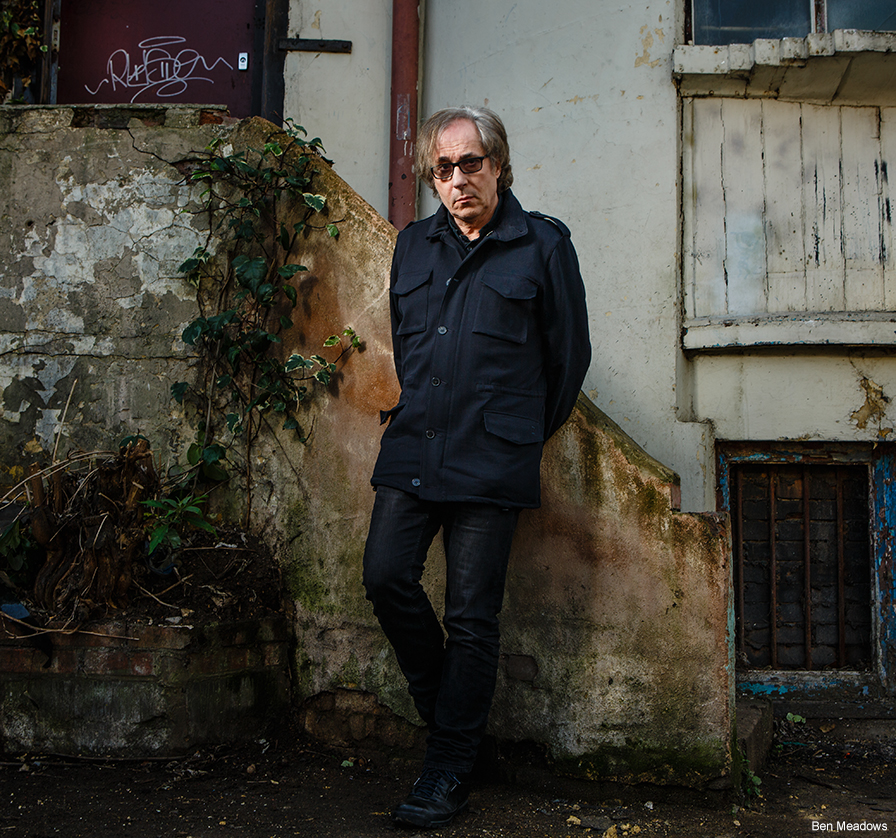
Richard Barbieri’s career is a study in contrasts. The keyboardist, composer and producer has been in highly-successful bands like Japan and Porcupine Tree as they hit tremendous populist heights, only to have both cease activity at the apex of success. However, Barbieri’s diverse solo and collaborative work beyond those groups is no less significant.
He just released Planets + Persona, his third and most ambitious solo album. The recording examines how duality is pervasive in modern life, within the contexts of relationships, creativity and the environment, both earthly and interstellar. Barbieri combines vintage analog synthesizers with acoustic instruments including trumpet, saxophone, vibraphone, and acoustic guitar to create ambient and pulsing pieces. Much of the album emerged from improvised sessions with musicians such as Percy Jones, Luca Calabrese and Lisen Rylander Love reacting to his initial constructs.
While Barbieri’s focus is now his solo career, the pathways established by Japan remain intact. The expansive pop act he began his career with in 1974 essentially had two break ups. It initially split in 1982, but regrouped under a new name Rain Tree Crow in 1989, only to dissolve again under the weight of tensions in 1991. But Rain Tree Crow was key to the emergence of a new group, Jansen Barbieri Karn, also known as JBK. It featured Barbieri, Mick Karn and Steve Jansen—three quarters of the classic Japan and Rain Tree Crow line-ups.
Between 1994 and 2001, JBK released several boundary-breaking albums. The band members evolved the compositional elements of their former groups in a largely instrumental setting, along with collaborators such as Robby Aceto, David Torn and Theo Travis. But JBK was more than a band. It represented an extended family of musicians yielding many other projects. Karn died in 2011 after a battle with cancer. Barbieri continues to work with Jansen as a duo.
JBK and Porcupine Tree existed in parallel for many years. Barbieri joined Porcupine Tree as a full-time member in 1993 after previously guesting on earlier recordings. Porcupine Tree’s leader Steven Wilson also worked with JBK in a guest capacity on several albums and tours.
Barbieri saw Porcupine Tree shift from playing in tiny clubs in 1993 to landing in large theaters and arenas by the time it went on hiatus in 2010. The progressive rock band hit several major musical heights, including releasing classic albums such as In Absentia and Fear of a Blank Planet. It developed a large, devoted audience that continues to follow its members across their many solo endeavors.
In addition to Planets + Persona, Barbieri released Not the Weapon But the Hand with Marillion’s Steve Hogarth after Porcupine Tree stopped. The album is an often understated effort full of textural nuance from Barbieri, supporting a wide range of Hogarth vocal approaches on ethereal, experimental, choir-like, and spoken word pieces.
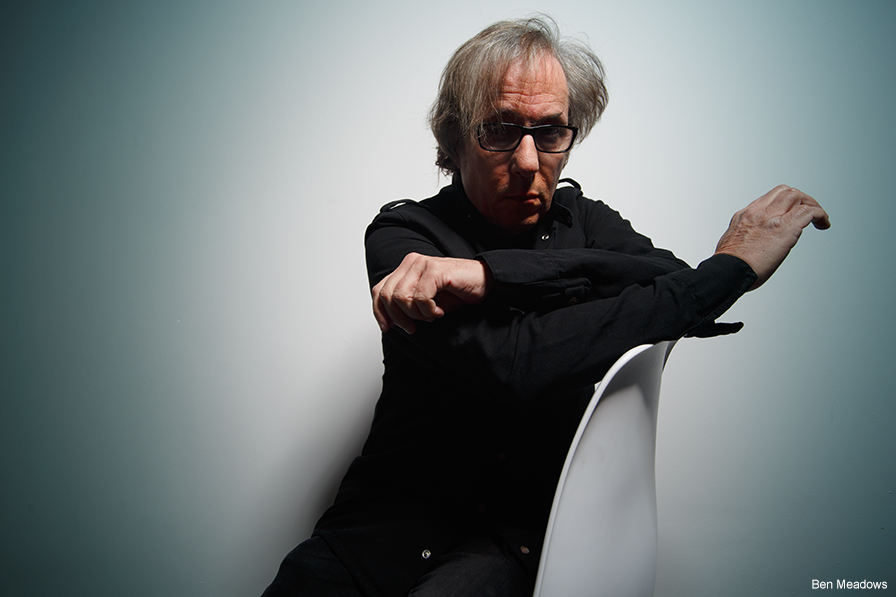
You’ve said you’re in a period of transition and that your solo career reflects that. Elaborate on what you mean.
It has been a period of transition since Porcupine Tree ceased activity. I’ve had to switch modes. My preference has always been to be part of a group. I’m more of a team player and I got used to that in terms of using my creativity within that framework. As time went on, it became apparent there wasn’t going to be any Porcupine Tree activity, so I started to focus on myself. I’m not very ambitious and don’t push myself forward very much. But I thought “I want to make an album and it feels like the right time.” I seem to go in six- or seven-year cycles when it feels right to do a major solo project.
I understand mortality has been on your mind and is also a motivating factor.
During the past year or so, I’ve been auctioning off a lot of memorabilia from my past. A year-and-a-half ago, I injured myself and was laid up, unable to move very much. I got bored and joined Facebook. I saw all of these Japan-related forums and got a handle on what people are like on it. There are attention seekers and nutcases, but there are also a lot of people genuinely interested in the music. I found there was a lot of demand for this old memorabilia I had no intention of keeping. I don’t have children and I don’t have any relatives to leave this stuff to. Having lost a lot of people recently, I know how chaotic things can get at the end. People’s possessions can just disappear. So, I got someone to auction the memorabilia and it helped fund the Planets + Persona album. Record companies don’t want to put money into an album until after it’s made. Of course, when you really need the money is when you’re making the album. So, those things went hand-in-hand. It was a nice feeling that people could get things that mean something to them and pass them on to their families and friends. It provides a longevity to the Japan archives.
I’ve also realized that in most social or band situations, I’m usually the oldest person there. I started thinking “Hang on, I’m 10 years older than these people.” I’ve lost a lot of my friends and family in recent years. I did start to ask myself where my life was headed and what I wanted to do with it. I decided I wanted to try and make an album that was more ambitious. I wanted to have more colors in my palette. I wanted to use more elements and people to make this music I was hearing in my head, rather than being a hermit and working with software at home. I wanted to create an experience and it put me in touch with more people. It was an empowering process.
Another element informing the album is that you wanted to be more selfish with it. How did that manifest itself?
I wanted to make the music I wanted to make, without any regard to what people who have certain expectations of what I do would want. Artists get caught in a trap in which they become very aware of what it is people like about them. I thought “This isn’t important for this particular album. This isn’t about programming sounds. It’s about me using other people to create sounds and execute on my ideas.” So, it took a different route.
How would you define what those expectations are?
I think it’s the very ambient, moody, electronic, warm analog textural thing with a lot of pads and slow builds. I think people would say “Yes, that’s Richard.” I used to generate these things at the beginning of Porcupine Tree tracks in concert. We would always say “How are we going to start this track?” Then someone would say “Richard, you start a mood.” In the end, it became “You start a load of waffle.” [laughs] It kind of turned into a joke. It was when the guitarists would tune their instruments. But it served a purpose and you can hear them in a lot of Porcupine Tree live stuff like “Buying New Soul,” “Dark Matter” and “Arriving Somewhere, But Not Here.” I’m able to quickly create a textural, ambient mood that sets a scene and you can hear it on those.
Tell me how Planets + Persona represents you defying those expectations.
I enjoyed working with more performers and acoustic instruments on it and let those people and instruments perform functions I normally would do with synthesizer programming. My prime thing was the arrangements, but the actual flavoring and coloring came from my musician friends. I’m very happy with the choices made and the sessions we had. It really was like a dream. I had a suspicion it would be good. I’m quite good at translating my ideas to people, but this really was a pleasure and it gave my work more colors.

Describe the creative concept behind the album title and artwork.
With instrumental music, it’s difficult to communicate a concept because it’s far more subtle than with a song with lyrics. You’re able to ram the concept down people’s throats with the latter. But the general theme that goes through this album is the idea of duality. There are three forms of duality the album explores. The first is the duality of the human condition—the age-old concept of good and evil, and love and hate. There’s a track called “The Night of the Hunter” which is based on the film of the same name. Robert Mitchum portrays a preacher man who is evil incarnate and wreaks havoc on a Midwestern town in the movie. The track goes through three phases: the beginning of innocence, how it’s slowly corrupted and the aftermath.
The other form of duality I find very interesting is my own as it relates to the way I work. When I’m composing, I tend to work in a very unconscious way. I work from very abstract starting points. Instead of writing chords and structures, I fly in random sampled sounds into a drum machine and then fire off those things. It’s about random moments. Nothing will be in a particularly-accepted time signature. Then I start to combine all of this and play a few things over the top. The other side of me, which I call the producer side—as opposed to the artist side—comes back to this material a few hours later and starts to analyze it. I’ll find that I’ve done things that are quite surprising. They’re almost like accidents. But the producer side pieces them together, makes sense of them and makes value judgements. It’s a kind of schizophrenic or a Jekyll-and-Hyde way of recording. So there’s duality to the process.
The last form of duality I look at relates to my fascination with planets and the solar system. When we look at these things from afar, they’re the most beautiful, peaceful images imaginable. Everything is so silent. But if you take away the distance and realize the actuality, these reflect the most turbulent, violent clashing together of matter and atoms possible. That was a visual influence on me for the tracks that bookend the album—“Solar Sea” and “Solar Storm.” So, distance creates an imagined, perceived belief in something, but the actuality is it’s completely different.
In “Night of the Hunter,” there’s an ominous vocal sample that says “Shake hands with danger.” What can you tell me about it?
I actually got that sample from an American health and safety broadcast on farm machinery. [laughs] This guy says “Shake hands with danger” and then it goes into a country and western banjo thing. It tells the story of how you have to be careful with farm machinery. On the track, it creates a bit of an uneasy, foreboding feeling of what’s to come.
There are jazz elements on the album, which is something new for you. Tell me about your desire to incorporate that influence.
The majority of musicians I’ve worked with over the years have been jazz or jazz-influenced. I also love more sparse and moody jazz by people like Bill Evans and Miles Davis. Bitches Brew is one of my favorite albums. Magma is one of my favorite bands of all time. I have no music theory or knowledge of jazz structures or chord progressions. I just do my own thing and incorporate the jazzy elements into the arrangements as I see fit.
I’ve been working with many musicians from a band called Isildur's Bane over the years. They’re a Swedish chamber rock group. Every year, they hold something called IB Expo in Sweden and invite three of four other artists to visit. You can get them to perform your music in any way you want. Aside from the usual instruments you get in a band, you have the added bonus of vibraphones, marimbas, violins, woodwinds, and horns. You’re able to add all these different colors. I did this a couple of times and really enjoyed it. Mick Karn, Adrian Belew, Pat Mastelotto, and Mel Collins have also taken part. Isildur's Bane added some jazz influences to my music.
What evolution do you see with Planets + Persona and your previous two albums?
My first solo album, Things Buried, was my first foray into composing an album on computer. It was done entirely in software. I didn’t use any analog keyboards at all. I was challenging myself to program digital and software synths. I did most of it at home. Then I took it out of the studio and worked with Percy Jones on bass and Andy Gangadeen on drums. They were my rhythm section for a few of those tracks. I can’t bear to just do my own stuff without other people’s input. It’s the most enjoyable part of the process for me. That album was mixed in Wales by David Wrench, whose career has rocketed. He’s worked on several number one singles in recent times in the UK.
The second album, Stranger Inside, was a progression from that. I had a rhythm section featuring Danny Thompson and Gavin Harrison on a couple of tracks. But the album was really held back by not having any money most of the time. I would go back home and start working because I didn’t have a budget for many other people and studios. That’s why I tried to raise as much money as I could for Planets + Persona. I also got out the credit cards when I had to. I didn’t care. I was okay going into debt making it because the music is important to me. Kscope was never going to give me enough money so I did what I had to do. I broke the bank to travel around and record at great studios with great people.
It might be a surprise to people that someone who has had a career with successful bands still finds it a financial struggle to realize music.
It really does go in cycles. When Porcupine Tree was active during its last few years, the money was fantastic. For the first time in my life, I was earning a decent amount of money and then suddenly, that stops. Immediately, 80 percent of my income is gone. Then I thought “Okay, I’ve been here before. So, now I do this and that.” It doesn’t stop me from being a musician, but the process changes. The same thing happened in Japan, although we didn’t really earn much money from it. It yielded significant funds for a lot of other people. We’re talking millions and millions of dollars for them. But when the band was active, we were better off. Suddenly, the band wasn’t active and I found that life was a struggle again. It’s very hard to remain a professional musician for 40 years.
When a long-standing band situation comes to an end, usually it's only the main writer, front-person or leader of the band that can make a smooth transition to a solo career with the support of management, agents, record labels, and, of course, most of the fan base. It's a tougher proposition for band members. Throughout the life of the band, you have all equally invested huge amounts of money by going into debt with advances and tour support. It takes a while to pay this off before you start earning royalties. If you’re technically gifted or have a session player mentality, then you have more options. However, I'm no session player or hired hand, nor would I want to be, so that does narrow things down. I don't network, it embarrasses me to push myself forward or talk about my talents. I've never found a manager willing to work for my interests or to find interesting projects. I don't socialize with many musicians and even when I do, we hardly ever talk about music. My own music could be termed "alternative" and not likely to sell in large amounts.
So, there are tough periods that one has to go through, but it has never diminished my enthusiasm for music or the creative process. I've made countless albums with many amazing artists, as well as my own solo recordings. It's always possible to find a way. They sell modestly well and get me by—just barely.
Finally, seven years on, the subject of Porcupine Tree is dead in the water or on hiatus. It seems to me unlikely that anything is going to happen, because there has been nothing recently to suggest that. It's Steven Wilson’s call. I think he's blown hot and cold with it in the press at various times. It can't happen without him, but to be honest even if it was suggested some time in the future, who knows what everyone's circumstances or feelings about it would be?
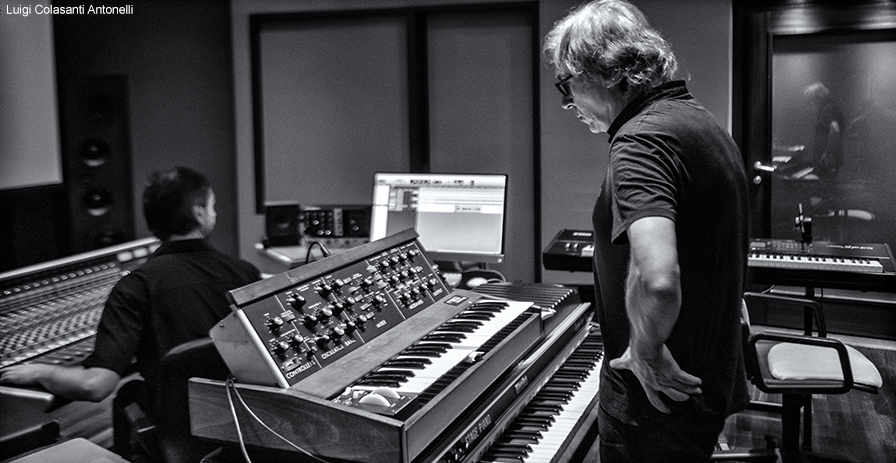
You work with vintage analog synths on the new album. Tell me about your desire to go back to that realm.
I think it’s something engrained in me from working in the late ‘70s and early ‘80s. That’s when synthesizers first emerged in a big way and it’s what enabled me to be a musician and work with a band. With Things Buried, as I said, I went out of my comfort zone and used software synths. That was interesting, but I find there is such a difference when using vintage synths and actually playing the music. With the new album, I thought “I’m going to have less cut-and-paste, and computer techniques involved.” Rather, I wanted to use the computer as a recorder and play things manually. I wanted to be hands on with this album. I also found it so much more enjoyable. I also love the contrast between the analog synths and acoustic instruments. I’m particularly pleased with the way the acoustic guitars and analog synths combined. There was something a little bit outside of the box with that.
What are some of the analog synths you used on the album?
I used a semi-modular Roland System 700 that I bought from Rod Argent’s shop on Denmark Street in London in 1976. It’s a patch bay type of thing, so you can set up any kind of path you want. I also played a Sequential Circuits Prophet-5, which is a polyphonic synth and probably one of the most famous synths of the late ‘70s and early ‘80s. I’ve used it on nearly every recording I’ve made. There’s also the little mono Micromoog, which I prefer to the Minimoog, because it has more programming possibilities.
Today, virtually no sound or effect is unavailable to musicians. Is reverting back to analog synths a response to that option paralysis?
Yes. When you’re working with computers, you have so many options and sound sources that it can confuse the issue. I think the best music I’ve ever made is in situations in which I’m quite limited by what I’m using. On Tin Drum, I used just two synthesizers for 99 percent of the album. I got to know what I was working with and the limitations actually inspired me to search for different sounds.
Another unique element of the album involves your use of treated voices by people including Suzanne Barbieri, Tim Bowness, Steve Hogarth, and Lisen Rylander Love. Discuss how you morphed their voices into instruments and textures.
Over the years, working with all these people, I’ve recorded a lot of their vocals. There are a lot of vocal outtakes too that I didn’t use. So, I worked with some of those vocals and treated them as if I was playing a synthesizer. I turned their vocals into something different and then I thought “Hang on, this sounds like a wind instrument. I’ll use it in that context.” For example, I took Tim’s voice and tuned it up three or four intervals so it sounded like a trumpet or flute. The listener gets the sense that there’s a voice, but not exactly.
I also did things like mix trumpet-like processed vocals with real trumpet sounds. I’d have a trumpet player double the vocal melodies by Steve or Tim. When Steve and I worked on our album Not the Weapon But the Hand, he did these kind of Bulgarian-inspired harmonies with very close intervals. I used those and found there were only one or two notes on the keyboard in which I could mirror the tuning. But I did and it worked really well. I used Suzanne’s voice in a similar way to a Mellotron. I processed her vocal into almost a Mellotron flute sound. I used Lisen Rylander Love’s voice in a different way. She performs all her voices live and manipulates them in real time. That was incredible for me and the best part of the album.
The point is I love vocal textures but I don’t want those voices saying anything specific on my albums. I don’t want anyone’s meaning or concepts on the recording.
Do you feel it’s important for listeners to extract their own meaning from your music?
For my solo instrumental work, definitely. I’ve worked with lots of people on collaborations and I defer to their compositions and serve the song and their ideas. If I’m working with Steve Hogarth, I build my sounds around his lyrics, which I love. He paints a picture and I produce sounds that combine with it. But if it’s my own album, I don’t want anyone else’s input in that sense.
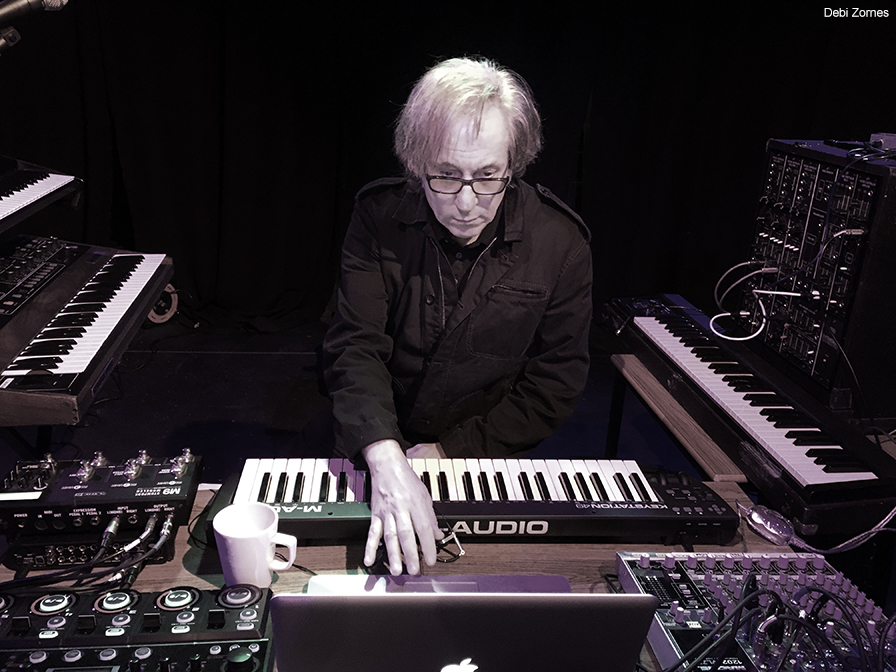
Describe your collaborative instincts when it comes to working on your solo projects.
I think I make musicians feel comfortable when they play on my albums. I think I’m able to get my ideas across and express what I want from them. I don’t think I’ve ever made a wrong choice with a musician. I just know what’s going to work. It’s that simple. I think I’m quite good in a production sense. I can also tell if something’s a struggle for a musician and I always have a plan B, C and D to move on to if necessary. I can always find ways of getting something I want from them.
How does that contrast with your group experiences?
In a group situation it’s different because a lot of the time I’m fulfilling a purpose for the others. It’s usually the singer-songwriter saying “It would be good to have something like this here.” It also involves me providing input and waiting for other people’s reactions. In a solo context, every decision is mine. In a group situation, things depend on the dynamic or even the particular time or day. If it’s a democratic group, anyone can influence things. In JBK, I sometimes asked Mick Karn or Steve Jansen to try something and they did the same of me. It was give and take. But when you’re doing a solo album, you want to be able to communicate every single piece of information required in order for the musicians to do what they need to do.
The album features an entirely solo piece titled “Interstellar Medium.” Is there an element of freedom inherent in that compared to the collaborative works?
It’s a totally different approach. There’s hardly a structure to the piece. It’s a very self-indulgent track. I didn’t really think about where it was going. I just liked the dubby reggae feel it developed. I EQed the track as I played it, which was a nightmare for the mastering engineer. I broke all the rules you should adhere to when you’re making a proper recording. It’s a quite an oddity, but it’s what I do when I’m left to my own devices with no discipline. [laughs]
Do you have any unrealized ambitions as a musician at this point in your career?
Film music. I’ve struggled to understand why I’ve never been asked to do any. It’s something I thought was obvious right back to the Japan days. But film music is a closed shop with very complex mechanics and business behind it.
In terms of ambitions I am realizing now, I’m doing a lot more live solo performances to support this album. I’ve already performed some this year. During the rest of year, I’ll be introducing more musicians with each show. For the first gig, I only had Lisen with me, singing and playing saxophone and electronics. The idea is by the time I get to my 60th birthday in late November, which coincides with 40 years as a professional musician, I’ll do a show with the whole band and perform the entire new album. I want every show to be different and to evolve to the point of the full band performance. The music will evolve and change as we get there.
What does it mean to you to be approaching age 60?
I don’t feel any different, but I’ve become aware of the fact that a lot of peers have been leaving us between age 60 and 70. It’s a precarious time for musicians who haven’t necessarily led the most healthy of lives. The death of Bowie set the tone for 2016. On the other hand, as I approach 60, I feel incredibly lucky to have worked with the kinds of musicians I’ve encountered. It’s a real privilege to play with these amazing people.
You’ve experienced the ups and downs of the music industry across your career. What’s your assessment of its current condition?
The problem we face now is how new, talented artists—not entertainers—can sustain a career in music. There aren't the levels of record sales that we had before or the investment from labels. The younger generations are being sold the idea that music is cheap, not precious and readily available anywhere and on any device. Current record sales and streams will not sustain careers.
The medium-level bands now currently making decent money from touring will probably face higher fees and commissions to do so. There are some venues out there charging a 30 percent commission to sell merchandise. Often the merch is what bands are relying on to make a profit.
The big artists—the entertainers—will always be okay. They will just make money from other sources like film and television sync fees, sponsorship, advertising on their domain sites, corporate and private gigs, and commercials. And how long before the biggest-grossing live shows will be computer-generated hologram performances from The Beatles, Led Zeppelin, Pink Floyd, Elvis, and Bowie?
I think people like you and I are part of the last generations to appreciate music in the way it has been appreciated for the last 50-60 years. At the moment, there are still people that want to go out and buy music and who value these recordings as something that truly enhances their lives. For me, that was everything growing up. I would go out and queue up for a record all the time. It meant the world to me. Now, music is an accessory for most people. It makes up a part of their day and they want it in little bite-sized chunks. Music is morphing into something else. There will always be great artists. There is great music being made. But in 20-30 years, how people experience it will be very different than how you and I did.
Here’s an interesting example. I read a Facebook post from a so-called music fan who records live shows on really good equipment. He shouts during the quiet bits so he can draw attention to himself and be part of the recording. There are real assholes out there. It’s why I do my solo concerts only in environments where people are seated with no bar. There’s no excuse for the audience to do anything else other than listen to the music. Otherwise, I couldn’t bear to go on stage to perform.
I’m going to be moving out of London soon. I’ll finally have a bit more space. I’ve never had space in my whole life. I’ve always lived in quite small apartments and never owned a house. When I move, I’m going to buy myself a record player. I’m then going to go out and buy my 50 favorite albums of all time on vinyl and just enjoy myself for a while. I should mention that Planets + Persona sounds amazing on vinyl. It runs at 45 RPM for maximum sound quality.
What’s your general perspective on streaming?
I can’t stand it. I’ll never be able to accept the treatment of musicians by these services. I had a depressing meeting with my record label about this. They couldn’t understand why I didn’t want my albums to be on Spotify. I said “I don’t mind being on Spotify. So, you can take two tracks from each album and put a little compilation on there. But if you want the whole album you’re going to have to buy it.” They were really surprised and said “We do make some money from it, so you will make some money as well.” [laughs] I can’t get my head around the absurdity. It would take thousands of streams in order to earn the same as one CD sale. How can artists who survive on very modest sales deal with this? Give up the idea of music having value and just use it as promo for the gigs and to sell t-shirts? That's how it was explained to me. Everyone seems to think it's great and maybe the concept of access and not ownership is the way forward for the consumer. Niche artists might look more to patronage and sponsorship via the fan-funding sites.
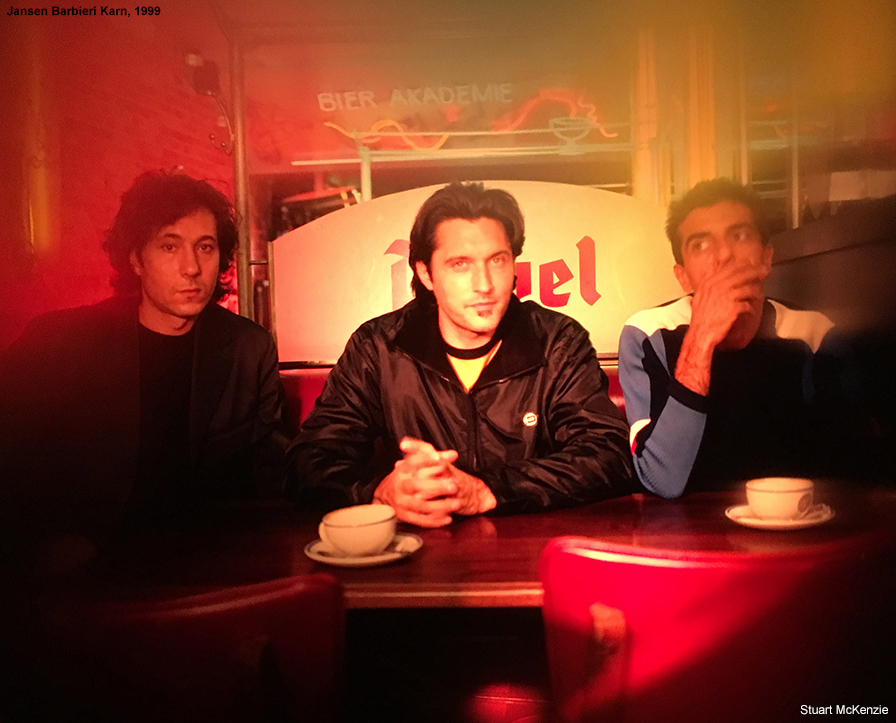
What do you consider to be the most impactful albums of your career?
My favorite works are Japan’s Quiet Life and Tin Drum; Rain Tree Crow; Porcupine Tree’s In Absentia and Fear of a Blank Planet; Jansen Barbieri Takemura’s Changing Hands; Jansen Barbieri Karn’s Ism; Hogarth Barbieri’s Not the Weapon But the Hand; and my latest album.
Rain Tree Crow involved less than pleasant circumstances surrounding its completion. Tell me why, despite that, it remains one of your favorites.
I think we all have good things to say about this album. All of my favorite albums across my career seem to be when a new sound or direction is achieved. Rain Tree Crow was released 10 years on from Tin Drum and had a completely different approach and feel. Everything was more organic and earthy sounding. The arrangements were opened up and quite experimental. Nearly all aspects were improvised in the studio. It was very enjoyable and fun to make, believe it or not.
It was only towards the end of the recording that problems started to arise. David Sylvian became more remote, leaving the country to record his vocals alone. There was disagreement as to the title of the album and the name of the band. At this point, David took control and being the only one able to afford the mixing, went ahead with that without us. To be fair to him, he had said from the start that he wouldn't use the name Japan. And from our perspective, we thought that a majority vote on an alternate band name would carry some weight. Since Virgin were willing to fund the mixing if we used the name Japan, we reconsidered it. It seemed reasonable to us because it was exactly the same personnel as the last Japan album. And we had made drastic changes in musical direction before under that name.
In retrospect, one could make an argument for both points of view, but the important thing in the end is the work itself and I have to say that David and Steve Nye did a really good job with the mixes.
What makes Ism the defining JBK album for you?
I listened to it recently and was quite surprised at how much I enjoyed it. There's a lot of energy in there and some very strange notations and arrangements. It sounds more experimental than I remember. Working with Zoe Niblett on vocals worked really well and Steve Jansen's voice seems much more at home with this backdrop than the Dolphin Brothers material.
In the more ambient parts, it carries on the Rain Tree Crow vibe. For the most part though, it has this direct in-your-face sonic force that I now really appreciate. I wish we could have made another studio album together.
Tell me about the making of Changing Hands and why it continues to resonate with you.
This was a collaboration with DJ Takemura from Kyoto. It marks a point where Steve Jansen and I gave up some control in the music-making process for the first time. Previously it would've been normal to correct any musical "abnormalities" or timing and tempo issues from a collaborator. Our history in terms of groove is on the beat. We grew up with machines, click tracks and rhythm boxes. Steve has immaculate timing and I can instantly tell if a beat is out.
A lot of DJs, hip-hop and trip-hop artists place beats before or after. I used to think that this was from a complete lack of understanding, but as an extreme example listen to Beyonce's vocal on "Crazy in Love." It's so far behind the beat, but consistently so. It sounds uncomfortable to me. To a much smaller degree, there were beats and musical parts and samples from Takemura that had this effect for me—like the piano in "Sun Trap in the Sea.” It's behind the beat, but combined with his other loops, it falls into a groove that we then worked with.
Another aspect that I like about this album is, more than any other, we let a musical passage or groove just play far longer without deviation or addition, than we ever normally would. It's more minimal than people realize.
How did the Steve Hogarth project emerge and what makes that chemistry special for you?
I first met Steve when he asked me to play on a solo album back in 1997. He was aware of my history and wanted some otherworldly and atmospheric touches on the songs. We hit it off immediately and have been close friends ever since. He formed a live "H" Band with a core of Aziz Ibrahim, Andy Gangadeen, Dave Gregory, and myself. Each short tour had additional guests to make up a seven-piece band. There is a really good live album called Live Body, Live Spirit that came out of those shows.
We had long planned to work together on something earlier, but our respective bands were always so busy. Not the Weapon But the Hand is one of my favorite collaborations. I think it shows Steve in a very different mode to the way he approaches vocals with Marillion—maybe because most of the tracks I wrote were not constructed with a song arrangement or form. The pieces were quite open and sparse. The vocals are often more like poetry, stream of consciousness and spoken word.
I thought it all came together beautifully on the opening track "Red Kite." I was thinking visually in terms of a vast bleak landscape and I used multi-layered pianos and violins to build this picture. When Steve heard it, he saw the same landscape, but placed these birds high in the sky and wrote in part from their perspective.
I wanted Dave Gregory to be involved in the album and his beautiful arrangements and tasteful guitar parts were perfect in this context. He is a sound designer with the guitar. So, it was great to work with such exceptional musicians as Dave, not to mention the legend Danny Thompson who also features on a track.
We followed this up with the Arc Light EP which featured the talents of Aziz on guitars as the main contributor. Finding time to pursue this collaboration further has been difficult.
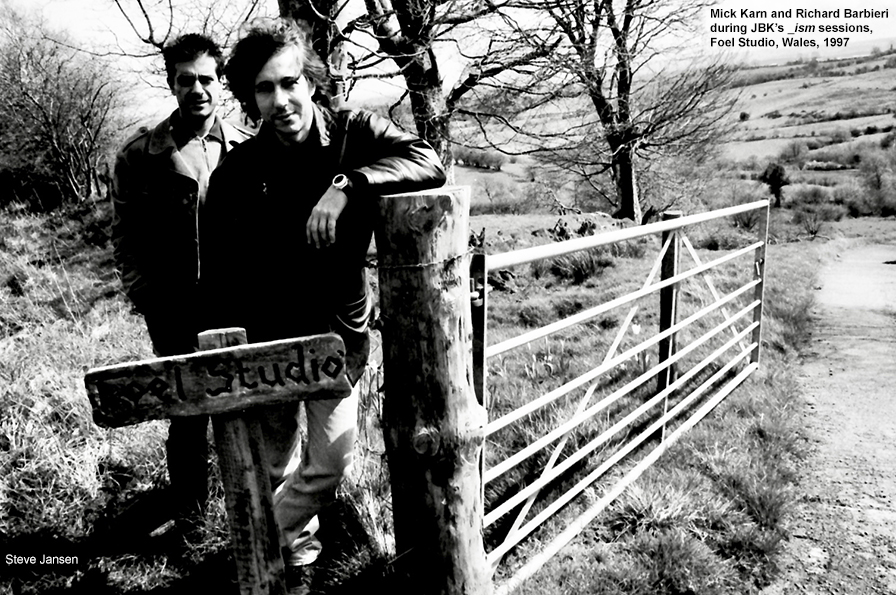
Reflect on your friendship and working relationship with Mick Karn.
He was somebody that was worth knowing, for sure. A unique and engaging character. Truly multi-talented. He had a personality that would draw people in. I've known dozens of people over the years who genuinely thought they were Mick's closest and best friends and were later confused as to why Mick had stopped calling. As much as he was a joy to know, he was equally a liability, but with every negative situation, you would eventually see the funny side and he was very forgivable. He smoked too much cannabis though, which I think gave him an alternate take on reality sometimes. Without doubt, Mick was a troubled soul. Beneath the joking and fun, there was a sadness there—and a dark place. His early years are covered in his book, which makes for interesting reading.
I miss him because we shared in so much along the way and despite the fall-outs every so often, he would still be here as one of only a handful of close friends that were with me throughout life. I miss that feeling of not quite getting what he was doing musically and then slowly making some sense of it and working with it. I couldn't work out where his melodic bass lines came from. Maybe his love of Turkish and Arabic pop or possibly classical music. He would compose some lovely arrangements with woodwinds and flutes and I would have liked to see if he could've taken this into a modern classical direction. Of course, his bass parts speak for themselves.
When I had to learn parts for his tours, it was interesting playing these oboe, clarinet or dida melodies on the keyboard. Quite challenging for me. It was fun doing those gigs, with David Torn involved. It was obvious Mick and David had a special friendship and musical understanding as well.
In addition to Karn, you’ve also worked a lot with Percy Jones. How would you contrast these very unique bass voices?
My reasons for working with Percy go back to Another Green World by Brian Eno. That was an incredible moment when I heard that album. Percy together with Phil Collins, along with Eno, that was a huge influence. I loved Percy’s playing as soon as I heard it. Mick worked in cycles. He would come up with an absolutely killer bass line over four or eight bars and it would repeat. It wouldn’t deviate, but you’d love it so much it would just stay in your mind. In Japan, it was the thing most people sang along to, not the vocals. I think Mick was an unbelievable creator of bass lines. With Percy, it’s more chaotic. There’s a lot more going on up the fretboard and with harmonics. I’m lucky to have worked with both of them.
Is Collins’ drumming approach an influence on you, too?
I love Collins’ drumming and so does Steve Jansen. Steve actually did that Collins thing, where you’d carry the drum fill over into the next section, instead of ending it at the verse. In other words, the drum pattern continues into the chorus and maybe stops around the second or third beat. That was very Collins.
Describe the creative trajectory JBK pursued after Rain Tree Crow dissolved.
We wanted to create a label and an environment under which the three of us could continue to work together or in collaboration with other artists without having any outside record company involvement, expectations or obligations. We wanted to be self-sufficient and fully in control. So, we formed the Medium label through which we released various albums for a decade.
Without a principal songwriter and vocalist involved, it became a very relaxed and democratic set up. With JBK, it was possible for anyone to take the initiative in a new piece or take a back seat. There was no judgement or pressure, just a freedom amongst friends to express their ideas and have fun doing it. We eventually got the chance to play gigs in Japan again together and brought Steven Wilson and Theo Travis into the live set-up.
I was thinking just the other day that the three of us hardly ever talked about music and most of our time spent together was not making music. When it felt right, we did it.
Is there further JBK material in the archives?
I don't believe there is anything left that could be released. I wouldn't want to take fragmented parts from jams or demos in order to make something. It's the same with the Japan material. I probably have close to 200 hours of rehearsals, demos and live material, but I have a responsibility to the artists involved and to the legacy.
I thought the Breakable Moons 10” vinyl was a nice release. I'd like to have a similar release for a 1997 Dutch radio broadcast of JBK with Steven Wilson and Theo Travis. It's called the 2 Meter Sessions and was nicely recorded live in the studio. I have a cassette of the full session and parts of it are on YouTube. I'd need to talk with Steve Jansen and contact the radio station to make it happen.
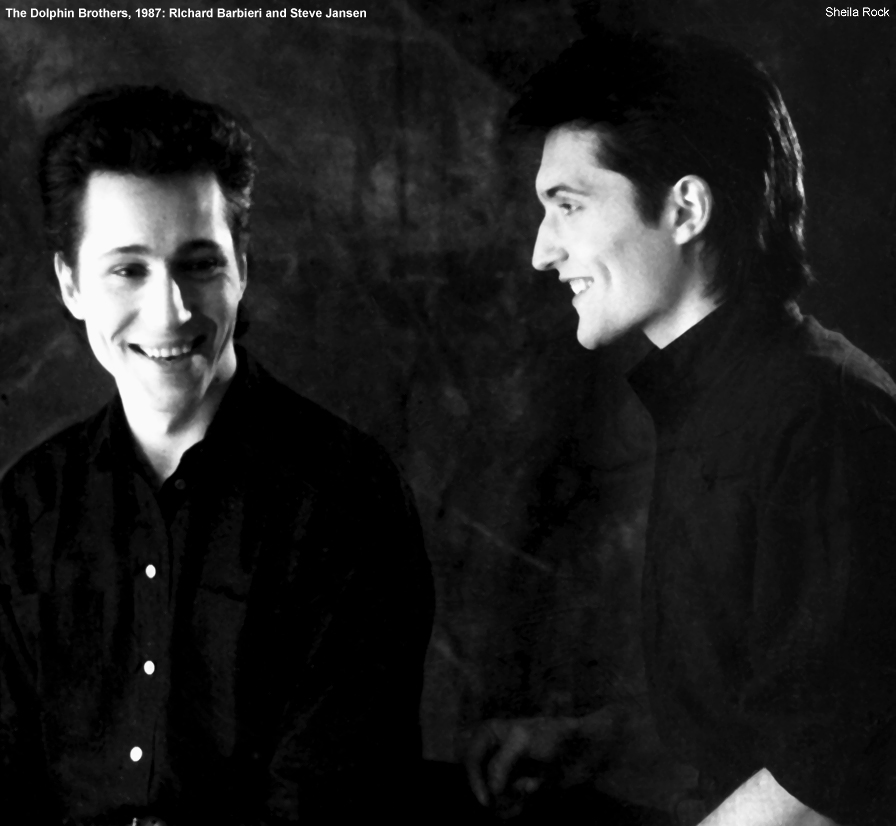
Tell me about the origins and vision for Dolphin Brothers and its sole album, Catch the Fall.
Steve Jansen and I fell into a trap of trying to write something that was against our natural instincts. We tried to craft a more commercial sound. There are only two Dolphin Brothers tracks that I really rate to this day and they’re examples of where we were just being natural and writing instinctively. "Catch The Fall" and "My Winter" are still great pieces. The rest are very much of their time and arranged with a commercial direction in mind.
It was still an enjoyable and creative experience. We recorded on location in the Bavarian countryside and then at Manor Studios in the UK. Richard Branson turned up to listen, danced around a bit and played snooker with Steve.
We had a good budget and invited an array of cool musicians to the sessions, including Danny Thompson, Mathew Seligman, Robert Bell, David Rhodes, Phil Palmer, and Martin Ditcham. Virgin Records obviously decided to take a gamble on us and with Steve singing, they probably thought that there was a fair chance of some commercial success. They seemed happy with the album and there was lots of promotional work lined up—and then suddenly, and for no apparent reason, they just dropped everything. The albums were no longer available in the stores and no-one was speaking to us. To this day I don't know for sure what happened, though I have my suspicions. In retrospect though, it's a good thing it didn't take off. We quickly reverted to our native instincts and started work soon after on Stories Across Borders and Rain Tree Crow.
You’ve pursued several duo projects with Steve Jansen. What makes him an ideal creative collaborator for you?
We don't have ego issues for one, which is a good start. We’re quite relaxed in each other's company and friends for long enough to be able to edit and comment on each other's input without it being a problem. Generally, Steve is more cerebral and tasteful and I'm more emotional and spontaneous. We work together as sound designers and we are very similar with our attention to space and atmosphere.
We worked and recorded more together in the same room in the earlier days. For the Stories Across Borders album, we took all the gear to Italy in Steve's jeep. We had been offered a space to record near Treviso by a producer friend of ours. It was a large garage annexed to his house. Considering that we didn't always have a dedicated studio area and also had lives and relationships outside of music, the working procedure was often that I would turn up in the day and get all my ideas down with Steve in engineering and technical mode. I'd go home and Steve would work in his own time on arranging what I had done and also add his own parts and ideas. Generally, the tracks would progress that way. Certain tracks though have been very much the "baby" of one of us with minimal input from the other.
What does the future hold for your partnership with Jansen?
I'm not sure. We’re both preoccupied at the moment with projects but there's no reason why we couldn't make another album. I would probably have to be the instigator with that, which is okay. The future does hold lots of Jansen-Barbieri Japanese meals and sake drinking sessions. I can say that.
During a recent trip to Japan, I found an ambient loop CD released under your name titled Cosmic Prophets. What can you tell me about it?
I was asked by a company called Caeru Cafe in Tokyo if I would contribute vintage synthesizer loops and textures for an audio sample CD. The idea is for people to sample your sounds and use them in their own music. I had long since given up being precious about my sounds when it became obvious to me that no-one would sound like me, even if I gave them my sounds. It's the context in which you use them and how you physically play them that defines a "sound" or character. The CD is a bit of an oddity that I don’t think many people know about.
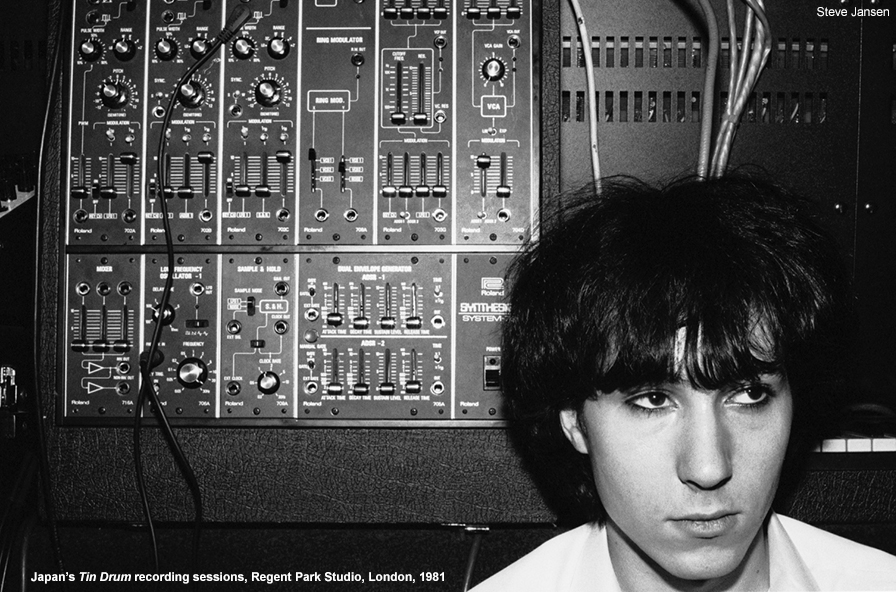
You sometimes perform with The Bays. Is that an ongoing relationship?
Some of the most exhilarating experiences I've had onstage have been with The Bays. It’s a four-piece electronic/ambient/techno outfit fronted by my good friend Andy Gangadeen. They never rehearse. They just improvise, so every show is different. They’ve also never released a record. I often guest with them. To demonstrate the diversity of performances, I’ve played with them in five-piece line-up shows in London and Tokyo; performed an improvised concert tour with a full orchestra, including a show at Royal Festival Hall; and played a live improvised soundtrack for Run Lola Run on a floating stage in Sydney Harbor, Australia. Amazing times. I missed out on the gig they did at The Barbican with guest Herbie Hancock.
You’ve collaborated with your wife Suzanne Barbieri on several projects. Describe the musical chemistry you share and the role you play in each other’s creative lives.
We made an album called Indigo Falls in 1998, but I don't think we were fully prepared or suited to working with each other at the time. We revisited all the demos from that period recently and now realize that we had six- or seven other songs that were superior in every way.
With home studio technology, which was ADAT machines at the time, I was working solo on preparing tracks and without an engineer. I was probably too indulgent with the intros and other sections, some lasting two-to-three minutes. It was a case of Suzanne trying to turn my instrumentals into songs and really that's not the best way to work if you are after very strong songs.
I've been using Suzanne's voice, naturally and mangled, on material since Dolphin Brothers. It's a very usable tone and texture for me. In terms of me appearing on her material, she stays clear of that, mainly to avoid the often sexist comments and perception that I’m doing all the work. She wants to avoid people asking “Did your husband help you with that?” The most crucial thing is that we are very encouraging of one another’s projects and pursuits. There are no demands, just total freedom to do what we want. We are the best of mates.
How do you look back at what you achieved as part of Porcupine Tree?
For the second time in my career, I played a part in taking a band from early stage obscurity to commercial and critical success. We went from playing gigs to two men and a dog in a pub to performing to thousands of people all over the world in some of the most amazing and iconic venues. There has to be a sense of pride of course and particularly with Porcupine Tree, because we really didn't have any luck or "fast tracking" along the way. For the most part, we were unfashionable and against the grain of the current musical trends at the time. The trajectory of the band was old school.
We built up an audience from word of mouth. We were an impressive live band from the beginning despite the limitations of playing horrible clubs. We played at the Bottom Line in New York City with half a PA working and no lights to speak of. But the main A&R guy from Lava/Atlantic Records was there and we still put on a great performance to more or less seal the deal.
We didn't look the part but we even played the Download Festival and went down well, while others were bottled off stage. There was an element of understated coolness about the band and I think we were more sonically ambitious than most. Steven Wilson's songwriting craft and lyrical content appealed to a lot of people outside of that whole prog-rock scene.
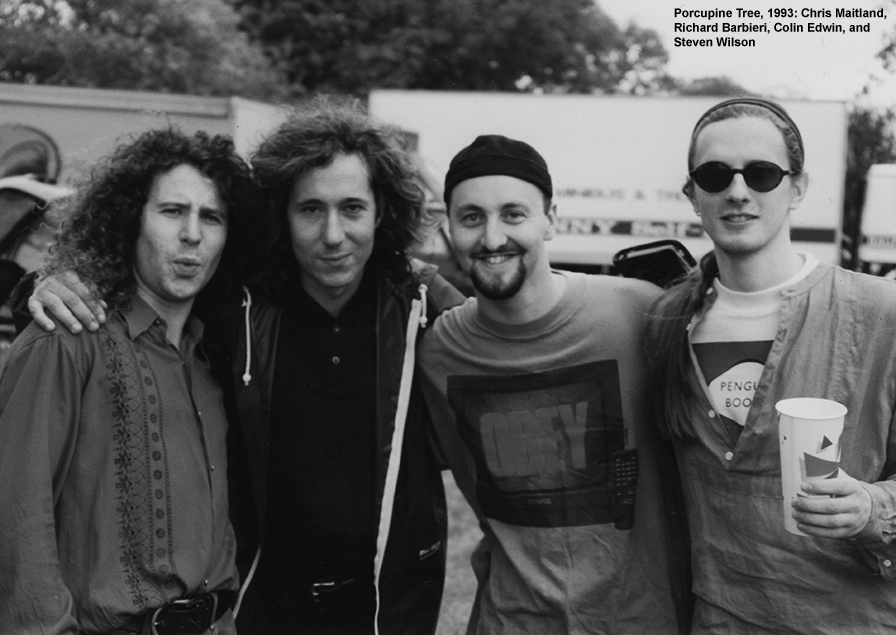
What do you consider the musical highlights of your time with that band?
In Absentia was really a big leap forward in many respects. Songwriting, production, orchestral arrangements, performances, and sound design all came together and though overall it was a more compact and guitar-led sound, I thought the material was really strong. There are actually far more gentle and subtle passages than most people understand.
Recording that album at Avatar Studios in New York City gave the proceedings a buzz and demonstrated what I already knew—that recording locations and environments really play a part in the recording process. From this point on, we would always allow for some group jams, writing sessions or studio time together on each album. It reset the path for us. We were getting supportive words and gestures from artists like Robert Fripp, Alex Lifeson and Neil Peart. Robert guested for us on a few tours and that was exciting to witness his soundscapes each night. Alex and Robert guested on the recordings that followed.
I felt we reached another peak with Fear of a Blank Planet. There was more co-composition on this album and we even started performing it on tour before we recorded the album. This was particularly useful for Gavin because he found that during a tour he would hit upon the best drum parts and arrangements. He likes to improvise within the structure as much as he can each night. Doing things this way allowed for more experimenting with the arrangements. And in a live setting, this was quite creative. I work the other way around. I improvise in the studio until there is something I really like and if it gets on the album, then I'll play exactly that same thing night after night.
I look back at In Absentia and Fear of a Blank Planet as great achievements and quite influential works. I hear their influence in quite a few bands now. Performance-wise, the Anesthetize DVD shows us at our peak I would say.
The live performances at Radio City Music Hall and The Royal Albert Hall were really special and meant a lot to me, too. They were such iconic venues and an indication of how far we had come as a band. Selling out the Heineken Hall in Amsterdam was quite a big deal and there were other memorable shows as well. An outdoor gig in Quebec was riddled with technical problems when we arrived. Our gear as well was damaged and we had to somehow secure replacements before showtime. People came forward with various bits of gear and eventually we were ready to go with minutes to spare. We went on stage as the sun was setting, with an incredible view and 5,000 people out there. We played the most perfect show. It was genuinely uplifting.
It's also worth mentioning the live radio sessions we did in the States. It wasn’t uncommon to squeeze these in during tours and usually this involved us traveling all night on the bus and turning up at the studio at 10am to do a live session for Sirius Radio or XFM. In a way, I think these sessions showed the band at its best because everything is so under the microscope in the studio. We released a couple of these sessions on our own imprint and they sound great to me.
Describe the creative influence you had on the group and how it manifested itself in the pieces.
Being the least suitable musician for a progressive rock band is possibly a creative force in itself. [laughs] I'm not a "player" as such and have no great technical ability or understanding of music theory or formulas. I have my own strange relationship with music. My style is generally to slow things down and let sounds and melodies evolve. The movement comes from my pre-programming, not from my fingers. I try to let one note have more movement and character than a few hundred notes in quick succession. This can still work well within the context of a fast and dynamic piece. I also appreciate that the space between events is as important as the event itself.
I think I brought an original and sometimes abstract element to the band's sound and combined with Gavin's playing on the recent albums, it set us apart from other bands in the supposed genre they call prog. I'd like to think I played a big part in the shift between dynamics in Porcupine Tree’s material and the multi-layered textures and atmospheres. I liked the challenge of finding sonic touches to complement Steven's lyrics. I was also involved in interacting with the drums using percussive synth parts and sequencers.
Steven had certain common ground with each member of the band and ours was a love of experimental, electronic music, ambient, and textural soundscapes. I had carte blanche to bring my own style into the mix. I would often set the scene with evolving intros and arrangements to songs.
From the beginning and aside from the music, I tried to have an influence in the way the band presented itself on stage, too. It was pretty shabby in the early days and Chris Maitland, the original drummer, and I, who had previous experience in more professional set ups, were always trying to tidy up the stage and get the lighting cues right. Chris brought in Ian Bond who remained our sound engineer from that point onwards. I brought in Gavin Harrison after Chris left, which I'd say was pretty influential in the scheme of things. Everybody contributed in many ways, but it was often seen as a one-man outfit by most of the media.
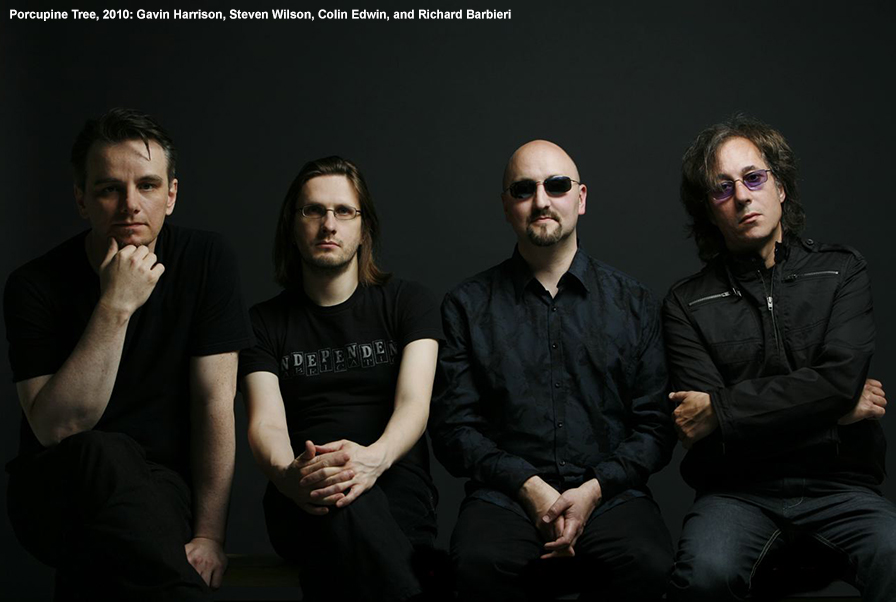
What are your thoughts on how Porcupine Tree wound down?
It appears to have gone out with a whimper and not a bang. In retrospect it would've been nice to finish with a stronger album than The Incident. I now don't think it is of the quality of the previous three albums, though I did like Steven's demos at the time. I find disc two, which came out of writing sessions as a band, more interesting. Fear of a Blank Planet had more of a band contribution whereas side one of The Incident was more or less a Steven solo effort.
I strongly believe we should have had the hiatus after the Fear of a Blank Planet tour. We had been recording and touring pretty solidly for half a decade and we needed a break. We were persuaded that doing a co-headline tour with Coheed & Cambria would be the best thing we could do. It just tired us out further and bored us. And then the tours following The Incident release seemed tougher and less enjoyable. My younger sister had cancer and faced brain surgery during these times and I remember using the sound checks to record my performances live with the band in case they needed to use these tapes should I be called away. In the end, my sister passed away after the gigs and I could be with her, but soon after that my father went downhill with Parkinson's disease and depression from losing his daughter. So, I was part caring for him and simultaneously being part of this now busy, successful band. It's tough touring in these circumstances and I know Wes Dearth had similar circumstances with his dad, Gavin Harrison with his mum, and also Colin Edwin had a young growing family. So, the atmosphere on tour can be affected. Things get exaggerated. I can be moody. The fact that I suffer from bouts of depression doesn't help. To everyone's credit, nothing ever distracted us from putting on great performances for the fans.
I originally thought in 2010 that Porcupine Tree would slow down and we would maybe make another couple of albums with a good break between them in order that everyone could make solo albums and generally get involved in other things. But it didn't work out that way. I don't give it much thought these days to be honest.
David Bowie was influential on you. Tell me more about that, going back to the Japan days.
When Bowie appeared on our TV screens in the early ‘70s, it was as if an alien had visited earth. It's hard to convey the impact. You have to place it against the backdrop of a grim and grey UK at that time with plenty of union strikes and power cuts. All the musical heroes of the time seem to be beardy guys in t-shirts playing rock and prog, which I was well into, by the way. Bowie was up there for ridicule, but for us and thousands of others, he was pointing to a possible brighter future. That he had emerged from our own area in the South London suburbs was further encouragement. Along with Roxy Music, this represented the beginnings of glam and art rock. Though I loved progressive rock at this time, I became more attracted to the strange sounds and intriguing lyrics of Bowie and Ferry. The way Brian Eno incorporated electronics and abstract sound into Roxy's songs was a huge influence on me. I used to listen to John Peel and Radio Caroline under the bedsheets into the early hours of the morning. The reception sometimes wasn't great and there would be instances when two stations playing different music were audible at the same time and at certain points there would be the most wonderful combination of notes or sounds. Totally complementary, but abstract. That was what Eno was doing with Roxy I thought.
I don't think we were massively influenced by Bowie in a specific musical sense, but more in a general way to be and exist. It seemed very glamorous and important. Bowie was ever present. He was like a guiding light. A new Bowie album was an event because you really didn't know what to expect. Each album was different, with a new persona and image. A new musical direction. If Bowie referenced a painter, a film or a poet, then you would check that out. He represented more art education than we ever received at school.
He stole from everywhere like most artists, but in small chunks, cleverly disguised and he mixed all these elements together. For example combining Krautrock with funk, and combining a funk rhythm section with cold and steely electronics. I noticed recently that the staccato-phased piano part before the chorus in "Starman" is taken from a popular Tamla song and the first four bars of the chorus is "Somewhere Over the Rainbow."
Bowie’s recording output across the ‘70s without a weak album, while launching and resurrecting careers for other artists, writing, producing, painting, and acting in film and theater, are such significant achievements. The man is unsurpassed in popular music and at 69 to end his days making an album that stands strongly alongside the best of his ‘70s output is simply incredible.
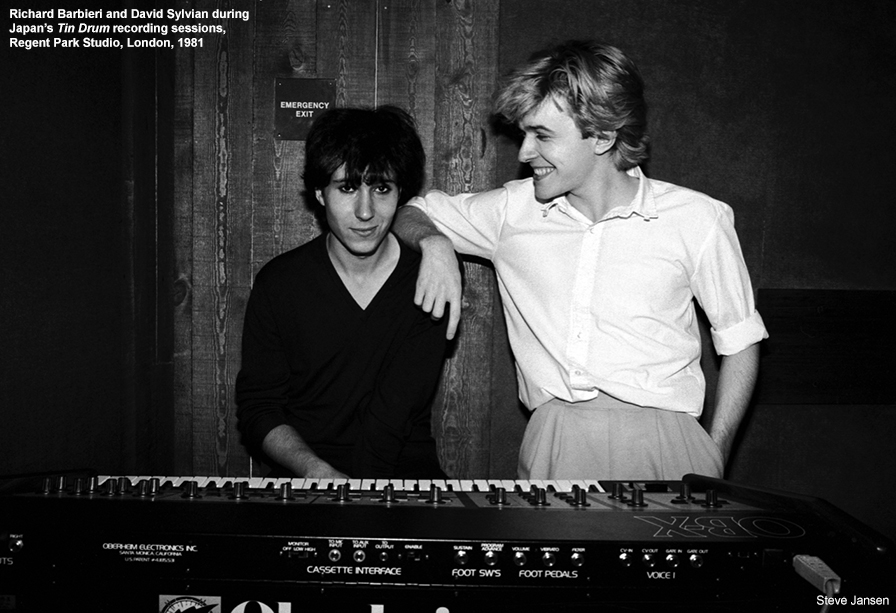
Thirty-five years after Japan broke up, how do you characterize its legacy, value and contributions to pop culture?
We are part of the UK pop culture of the early ‘80s, whether we like it or not. Once you appear numerous times on the BBC, then you’re in the archives. We still appear on TV in the UK quite regularly. Also, if you were in the tabloid press, which are the UK’s best-selling newspapers, then you were more or less considered famous. To be recognized before you reach the end of your road would classify you as well known to say the least. So, yes the music and the image are there in the archives. There are periods of the band’s output that fit snugly within the New Romantic movement, but for the most part it isn't really of that time. Tin Drum and particularly "Ghosts” are evidence of that.
I think we pursued the art pop route just as Bowie and Roxy were becoming less inventive or more mainstream at the start of the ‘80s. Even though we were the second most commercially successful singles act of 1982, we were still considered slightly underground, which suited us. We didn't have much interest in the scene at the time. A lot of other bands and artists were quite interested in us though and would follow us around, literally.
Kate Bush visited the studio and listened to our playbacks. Paul McCartney would pop his head through the door to hear what we were up to. He even offered to play some acoustic guitar for us, which now that I think of it, would have quite suited Tin Drum. There isn't an acoustic guitar across the whole Japan catalog. Various producers showed an interest. I would say we were different to the other pop groups at the time because Steve, Mick and myself were quite distinctive sounding. We had an element of originality to our playing and our peers picked up on that.
The fact that all of the members of the band have gone on to record in excess of 100 albums of quite alternative and non-mainstream music over the subsequent four decades shows our dedication to our art. I'm not sure there are many bands of that era who did the same. They either stopped when the fame or money stopped or just kept going, playing the old hits over and over again.
Do you have any regrets about your time with Japan?
Just the business side of things. We were very young and needed good advice and some near-term financial security as things were coming to an end, but everyone outside of the band profited, not us. Also a fair publishing split should have been established around the time of Quiet Life—not equal, but to at least recognize the writing and arrangement input of the members of the band.
Both Japan and Porcupine Tree broke up on the verge of major commercial success. Describe your thoughts on this.
It's frustrating but you can only watch as it falls apart. Unfortunately, it's usually when a band arrives at a point of achievement or success that the cracks suddenly start to appear. Ego and personal ambition usually come to the fore. It's no great surprise because all the signs are apparent quite early on, but you do wish it would last a little longer, especially as you've all come so far and worked long and hard to get there and also if you think there is still potential there.
Is there a spiritual component to your music?
Not in any religious sense. I'm an atheist, but all the trappings and paraphernalia of religion are very attractive to me. I’m also attracted to places of worship, including churches, temples, and cathedrals, as well as religious music of all faiths. I find the Spirit of Eden album by Talk Talk somehow spiritual. The same with some pieces by Arvo Pärt.
There's a track on my new album called "Unholy" which relates to this. It's a deceit of sorts. All the sound design and musical elements hint at a religious or ceremonial setting. There’s a prayer-like voice, an omnichord which is very shamisen-like, chimes, kora, various ethnic instruments, and church harmonium, but without any religious sentiment. To my ear, it is still uplifting and moving. When music or anything we experience in life briefly heightens or raises us up to a level where we feel moved or "altered,” I feel that could be an interpretation of the spiritual.